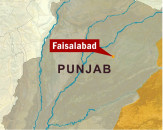Young professionals making it big: Fast Company
Economy is kaput but new breed of young graduates of Pakistan’s premier universities, are carving out a niche.

If you graduated from college this summer and are eagerly looking forward to your first job, I have some sobering news for you. The economy has not been doing particularly well for a while now, and big firms have barely been hiring for years.
It took roughly a year for my class of 2010 at the Lahore University of Management Sciences (LUMS) to get their first jobs, and another two years for most of them to get the jobs they wanted.
But that was just one class, less than 500 students, from one of the top universities in the country. About a million students enrolled in universities across Pakistan in 2009, and at least two-thirds of them would have graduated this summer. That’s hundreds of thousands who will make a beeline for the handful of formal, well-paying jobs in large cities of the country. It won’t be long though before they realise that there just aren’t enough to go around.

Of course, that’s just the tip of the iceberg: there are just not enough jobs in the country, period. In 2011, there were roughly 33m 20-year-olds in the country, with about 60% of them claiming a stake in the labour market. The entire labour force that year, however, was slightly over 53m, with 70% of these jobs in rural areas. Of the remaining urban jobs, only a quarter were in the formal sector. The competition for good quality, well-paying jobs, therefore, is absolutely cut-throat.
Brewing trouble
A recent World Bank report says that both labour force and employment grew 3.6% between 2000 and 2010 in Pakistan, registering the highest growth on both counts in South Asia. Heartening news, but the report does not look at the nuances. The majority of that growth was clocked in before 2007-08, when unemployment hit its lowest level in a decade: 5.5%. Since then, rural unemployment has remained largely stable, around 4.7%, but urban unemployment has soared, from slightly over 6% in 2007, to almost 9% in 2011.
This is the peculiar phenomenon that has been brewing, particularly in our cities, for the past six years. This is the source of nightmares for the hundreds of thousands of university graduates today. The economy became particularly sluggish from 2007 onwards, but university enrollment has continued to gallop ahead.
In the past five years alone, enrolment at universities has more than doubled. If you go further back, let’s say a decade, when the Higher Education Commission was set up, enrolments increased more than five-fold. This means not just more people entering the labour market but a large number of highly educated young men and women entering a sluggish job market with extremely high expectations.
Way out?
So what happens when you push thousands of well-educated young women and men against the wall of unemployment? They build a door. Not just for themselves, but others as well.
Self-employment is the most prevalent form of employment in Pakistan (almost two-thirds of the labour force in 2009), but not in urban areas. About 45% of the urban workforce was self employed, compared to 71% in the countryside in 2009. A greater percentage of city workers chose regular wage or salaried jobs than their rural counterparts. This divide is not just geographic though. Almost half of all the workforce in Pakistan was self-employed, but at the low end of the value chain. Only 13% was self employed in high-end jobs. This is the number that will have to rise if Pakistan wants to transform the way it works, and, consequently, its fortunes.
Self-employment: the push factors
Entrepreneurship is the new buzzword thrown around at seminars, forums, career offices, and in the media. But for those advised to practice it, it is scary. Why would a fresh graduate sacrifice the comfort and perks of a salaried job to start a new business, with a high probability of failure? The answers, it turns out, are several.
Foremost, is the sheer dearth of good quality, well-paying jobs. Second, is the mismatch between skills available and those required. Universities are churning out scores of business, finance, computers and humanities graduates while the job market still largely demands traditional blue-collar workers.
Third, graduates are more demanding. Salaries have not kept up with inflation, which also means they have not kept up with rising university fees. Tertiary education is an investment, and everyone who makes it, expects a return. A top university graduate who spent over a Rs100,000 per semester, will not settle for a Rs15,000 per month job.
What attracts?
Over-supply, mismatch with demand, and lower returns are factors that push young professionals away from salaried jobs. Independence — financial, intellectual and otherwise — is the strongest pull factor of self-employment. But along with the perk of having one’s own working hours, the ease of starting up and running a business is also attracting wary young professionals into setting up their own enterprises. What has made setting up and running a business easier?
Connectivity, provided by advancements in technology, and low marketing and promotion costs, thanks to social media. Simply put, social media makes business easier to do — whether that’s traditional retail, or new technology-related enterprise. Facebook replaced print media and YouTube television when it came to advertising.
Another key factor is room for innovation that allows for entrepreneurs to be creative, cut costs and drive revenues. Not every business needs an office. Not every restaurant has to be a dine-in affair. Not every PR agency has to be full-service. Not every clothing business needs a fancy boutique. Ease of doing business means there’s more competition, which, in turn, is fueling innovation. New enterprises are like low-cost airlines — specialized, no frills. They provide a particular service, do a brilliant job at it, and rake in a premium until more players enter their specialised arena. It’s competitive, but in a good way, and it’s where the future of millions of 20-year-olds will lie for years to come.
…………………………………………………………………………………………………………………………………………
The cost of starting a business
We asked our budding entrepreneurs what it costs, approximately, to set up businesses similar to theirs...
Solar systems manufacturing facility: Rs350m
50-table restaurant in a rented, upscale premises: Rs4m-Rs5m
Retail outlet in a rented, upscale premises: Rs3m-Rs10m
20-table cafe in a rented, upscale premises: Rs2m-Rs3m
Web-based businesses (Online retail) Less than: Rs50,000
Event Management/PR Company Less than: Rs25,000
Home-based caterer (publicised via Facebook) Less than: Rs10,000
…………………………………………………………………………………………………………………………………………
Can entrepreneurship be taught?
Entrepreneurship is not a fad. It’s the future, and Pakistan’s leading institutions have now started to invest in the discipline.
“There was a realisation at IBA that quality jobs are getting more scarce, and that the college would have to equip its students with entrepreneurial skills,” said Jami Moiz, an assistant professor who is associated with the university’s Centre for Entrepreneurial Development (CED). The centre was envisioned 10 years ago, but only recently reached fruition with the establishment of a swanky facility at IBA’s main campus. The college also started a BBA in Entrepreneurship in association with Babson College, which Forbes declared an ‘Entrepreneurial Powerhouse.’
“Babson is the leading American school that believes that entrepreneurship can be taught,” said Moiz, who was one of the faculty members who went to Babson for training, and have set up the programme at IBA upon their return. The first class of BBA Entrepreneurship, comprising 35 students, will graduate in 2015.
The curriculum is exciting. Students are taught the basics of business in the first semester, and are required to come up with an implementable business plan. The business has to be executed in the second semester, with IBA providing the seed money, anywhere between Rs10,000 to Rs100,000. After running the business for a semester, the students have to liquidate it.
“We want them to go through the full circle of conceiving, planning, setting up, running and wrapping up a business,” said Moiz. The first batch came up with varied ideas — an on-campus eatery; IBA-branded clothing and accessories; customisable, hand-painted canvas shoes. But the most profitable venture was an online trading concern that exported garments to expats in Canada and the UAE. With a start-up capital of Rs20,000, the business made a profit of Rs24,000 in its six months of operation. It was sold to private individuals at the end of the semester.
It’s not just the privileged students at IBA who are learning these valuable skills. An agriculture-specific entrepreneurship development programme, in partnership with the Sindh government, provided similar training to 60 young men and women from rural Sindh. The programme involved four months of teaching, and two months of working with an established entrepreneurial venture. Businesses that came out of this exercise included a mango-processing facility, a chilli-processing business in Kunri, and a birds business that started with two parrots, and now has 128 different birds.
…………………………………………………………………………………………………………………………………………
Of change
We look at six young, urban professionals who graduated from top universities of the country, but decided to chart their independent, albeit risky course. All of them started in their mid-20s, in the last six years, and persisted despite challenges that forced a large number of traditional enterprises across the country to shut down. This is not a scientifically representative sample, nor are they the most successful entrepreneurs, but they all have stories to tell. Stories that may inspire others to take the path of these trailblazers.
…………………………………………………………………………………………………………………………………………

Accessibility is key to empowerment, and the four young partners behind L’atelier — a French-inspired premium multi-brand store in Lahore, Islamabad and online — provide precisely that. Stocking 65 designers in Islamabad and 50 in Lahore, the store deals in powerhouse brands as well as upcoming labels.
The idea came from the only man in the four-person team, Ahsan, but the women bought it instantly, says Zahra Raza, one of the partners who graduated from Beaconhouse National University. At that time, Sadaf and Ahsan were living in Paris and were inspired by the Parisian attitude to fashion and shopping, which is all about the experience. “I was marketing Pakistani designers abroad, while Sarah already had an established client base for her eponymous brand Sarah Raza,” Raza adds. They pooled their talents — Sadaf’s marketing expertise, Ahsan’s finance background, Zahra’s sales skills and Sarah’s fashion knowledge — and started their multi-brand store in 2010.
Three years on, there is a second outlet in Lahore, and a website that delivers worldwide in three days. While the quartet had set out with a goal to provide a superior retail experience, they have inadvertently altered the face of luxury retail in Pakistan.
The store works on a rack rental model. A designer can rent out a half or full rack, for roughly Rs40,000 per month. For that price, the store provides space, publicity, and customer service. The space is not just for big names. According to L’atelier’s website, “approximately one-third of the brands present [at the Lahore outlet] were introduced to Lahore for the first time.”
Karachi is L’atelier’s next stop and then they hope to expand beyond Pakistan’s shores. But Raza isn’t ready to say where just yet.
…………………………………………………………………………………………………………………………………………

In 2006, Bryan Adams was the first major international artist to visit Pakistan in my generation’s living memory. The concert was organized by a major Dubai-based media group. Then came 2007 and everything collapsed. But in 2010, Romanian band Akcent performed in Lahore in a well-attended but low-key concert organised by a fresh LUMS graduate, Imtisal Zafar, and his business partner Arsalan Khan.
“It was quite a challenge to bring such a big artist to the country considering the security and financial constraints,” says Zafar, who had formed an event management company with Khan in 2007, when he was still at college.
“The security condition was terrible and a recession was just setting in,” says Zafar “Most events were being cancelled, due to bombings, and there was no surplus money that companies wanted to spend in order to organize events.”
Today, Verve specialises in corporate events, private and commercial-themed parties; product, outlet and franchise launches; fashion shows, concerts, sports events and weddings. “Here we are, six years later, working with some of the biggest brands in the country,” says Zafar.
…………………………………………………………………………………………………………………………………………

In 2004, siblings Shahrukh and Shahjehan Chaudhry introduced Karachi and Lahore to Home Express, a glossy, classified magazine replete with discount coupons from restaurants, boutiques, parlours, hair dressers and other services. By the time the company was sold in 2010, it had a staff of 30 people. Shahjehan went on to set up Teamants, a dedicated social media and brand development agency, and Shahrukh set up Dealtoday.pk, Pakistan’s answer to the wildly successful Groupon. Contrary to expectations, Dealtoday delivered 43,000 orders in its first year. The platform now has over 12,000 customers and processes 500 orders a day. Dealtoday’s Facebook page has 615,000 followers. Meanwhile, Shahrukh is also in the planning stages of a travel website, Traveltoday.pk that will provide discounted deals.
…………………………………………………………………………………………………………………………………………

Saud Ahmed has yet to graduate, but has a string of startups under his belt. “My experience [as an architectural coordinator] at the industrial plant [of a large multinational in 2008 ] sparked my interest in construction and interiors,” says Saud who went on to set up QS Consultants, a small firm that provided one-window solutions to homes and offices for repairs and renovations.
A friend’s contact helped him set up an event management company, Dimensions. Months later, he joined three other friends to set up a 50-table Chinese restaurant in Clifton, The Lantern, which hopes to open a Pakistani counterpart, Laltain, in Dubai or Malaysia. He also recently partnered with a group of Australian friends to set up an online buying platform, Lootlo.pk. “There is one lesson that I live by: to minimise risk, diversify your portfolio.”
…………………………………………………………………………………………………………………………………………

Pakistan has been in the dark, quite literally, for years. Scores of small firms providing ‘solar solutions’ popped up, but were only importing the panels. Zaid bin Azam decided to venture beyond the family’s textile business, and set up a solar panel manufacturing plant — the first in Pakistan. “We started off as solar installers, but were always dependent on the importers for the panels,” says Zaid, adding that this propelled him to set up a panel manufacturing plant given the untapped market. But then, he discovered that they needed people who would be able to fix them. So his company sent engineers abroad to train them in installing the manufacturing machines, fixing them, making solar panels, and designing complete solutions. A system that can run three fans, four energy savers and an LCD TV for eight to ten hours during load shedding would cost about Rs180,000 to install. Then, you can forget about it for the next three to four years after which, you would simply have to replace the batteries, explains Zaid. “Our biggest challenge is the mindset. We have to make people understand that the days of cheap, abundant electricity are over.”
…………………………………………………………………………………………………………………………………………

Waqas Ahmed boils down the working dilemma to this: at one end of the spectrum are firms where you work for a monthly salary which is not representative of the value you provide to the company. At the other end are services like Freelancer.com and Elance.com that provide a marketplace for freelancers where they can find work, in return for a large percentage of their earnings. He, therefore, went on to create a free, open source alternative to the existing freelancing marketplaces where clients and freelancers could directly interact, collaborate and finish projects, and nobody had to pay the middleman. The result is Opensource.com.pk.
“My co-founder [Rishadullah Shaikh] and I had been working as freelancers for many years, besides working full-time jobs. On both these jobs, we were at a disadvantage. We needed a service that could connect freelancers directly with clients and allow them to collaborate,” Ahmed says.
In the technology industry, knowledge trumps money, he insists, adding that they set up without any funding whatsoever. Growing the team and finding clients who ‘get it’ were some challenges. “At some point, startups need funding and investment from angel investors or venture capitalists. We don’t have those in Pakistan, especially not the ones who understand the value of technology,” Ahmed says.
After six months, they have a website and platform, in addition to a network of professionals who work with them. The company has started paying monthly salaries and has secured contracts that can sustain it for the next year. “We want to be the biggest network of freelance developers, designers, writers and artists in Pakistan.”
Published in The Express Tribune, Sunday Magazine, June 16th, 2013.
Like Express Tribune Magazine on Facebook, follow @ETribuneMag on Twitter to stay informed and join the conversation.
COMMENTS (12)
Comments are moderated and generally will be posted if they are on-topic and not abusive.
For more information, please see our Comments FAQ























“Our biggest challenge is the mindset. We have to make people understand that the days of cheap, abundant electricity are over" LOL...there's nothing wrong with this 'mindset'...its called being rational.
This is a very healthy trend. The author has done a good job of highlighting this topic. I am familiar with one more institution, SZABIST, whose students have done very well both in the job market and in starting their own independent businesses. I wish all these young entrepreneurs well.
Entrepreneurial Development Program of IBA, as discussed in the article seemed interesting. Its focusing on lower tier of society and the students are successfully launching their businesses. http://ced.iba.edu.pk/edp.php
Instead of being overly-critical and negative, we should be proud of our youngsters who have the skill and courage to rise up. No matter which class they belong to, these things don't happen without hard-work, dedication and the audacity to listen to your creative genius. We all have ideas but we fail to put them through not because of our lack of resources, but because of the excuses we make to ourselves and the world. I applaud these leaders of the next Pakistan.
Seems like a very skewed viewpoint. All business graduates from the top two (and most expensive) business schools of the country, backed by affluent families. All of whom can afford to experiment, and move on should their startup fail. Most 20 somethings here do not have that luxury.
What I would like to see is how many young entrepreneurs have actually managed to set up and sustain their startups, and actually make a living from it.
Now that would be knowledge our unemployed fresh graduates would actually be able to use.
The biggest investment in entrepreneurship business has always been Creativeness, Invention, innovations and Idea with better shape and convenience then old ones.I worked in a private NGO with temed Rs.10000 salary in 2010.Later in 2011 I started my own call center Rs.20000 investment but got failed, in 2012 I started A Sports Trading Company "Dawnray Sports International" with only Rs.19000 rupees in my pocket and now with grace of God almighty Dawnray is officially working with considerable sports bodies of Sweden, USA, Canada, UK and Germany. Its 1 year old company www.facebook.com/dawnrayinternational or "(www.dawnraysports.com) will be restored next week after some new updates" I got idea to hit the sports clubs using social media and other sources of free internet marketing and sales. Im did MBA in Marketing in 2009 from Virtual University of Pakistan and Im from lower middle class family but now Im at the stage to hit the big sports companies of Pakistan very soon as a tough competitor...So believe in yourself, work hard, work creatively , be honest...then...........".you'll get from Allah, you'll try for" ALquran Regards Noor Ahmed Choudhary 0092-300-8417710
Just classify the above 6 people into lower, middle and upper class then look at the results. ET should have mentioned their class as well which is very important in this regard. Most of the people who get their education from LUMS and IBA are from upper-middle or upper class families. Entrepreneurship needs money which is unfortunately not available to the larger slice of these unemployed youngsters.
A positive development, it is a trend around the world for graduates to start their own businesses.
dear sir nice job
There are so many more successful businessmen/women in Pakistan. What is so special about these? That they went to school?
so that is good but what is the spread of this oppertunity? How many of these are from middle or lower middle class?